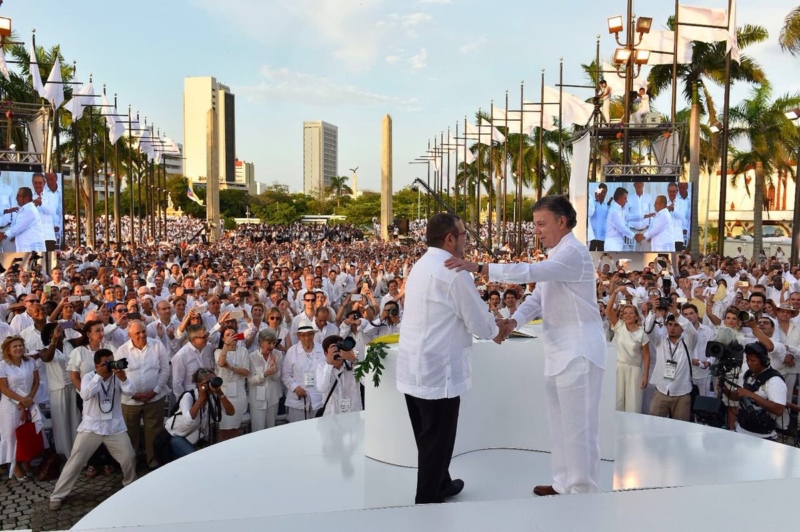Washington’s Mixed Signals
It is not easy to interpret often mixed signals coming from Washington about US foreign policy. But with its wide-ranging agenda, Colombia seems especially complicated.
The agreement signed yesterday by the government and the FARC is one of the few pieces of good news in a tumultuous world. It is a historic achievement for Colombia, one that should be celebrated and recognized for putting to end to an armed conflict that has plagued the country for more than half a century. It also marks my personal relationship with Colombia, having first come to Bogota to study International Affairs and Political Science more than 40 years ago.
This agreement is partly the result of the persistent and tenacious efforts on the part of the administration of Juan Manuel Santos since 2010. But it is also thanks to the intense work of previous governments, supported by a broad national consensus on the importance of achieving peace with the country’s largest guerrilla group. In these decades of internal conflict there have been significant successes and also frustrations, including with FARC. The peace process led by Santos also had setbacks, but was notable for its sophistication and depth, building upon and learning from the lessons of previous negotiations.
Nearly the entire international community has shown its enthusiastic support for the negotiations, and pushed for success. All of the governments in Latin America and the Caribbean, despite ideological differences, supported President Santos in this risky endeavor. That Washington, Caracas and Havana have supported this process from the start underscores its hemispheric importance. The whole region will benefit from Colombia’s historic accomplishment: for the first time, the Western Hemisphere—half the world—is at peace, and that should be a reason to be proud.
Of course, the United States is also celebrating, particularly because of the long history of collaboration between the two countries. This cooperation centered on a package known as Plan Colombia, a massive, $10 billion program over 16 years. That policy, supported by both Democrats and Republicans, was adopted in 2000, when Colombia was facing a critical moment—a weak state besieged by both the FARC and paramilitary forces.
At that moment, when emigration was the only way out for many, the very viability of Colombia was at stake. But Colombians came together to pull their country out of the abyss. The objective of Plan Colombia was to strengthen state capacity and increase military pressure on the FARC. It is clear that the signing in Cartagena would not have been possible without this fundamental step. The United States and other countries contributed, but the main effort came from Colombians themselves.
In 1999 I directed a commission of experts in support of Plan Colombia, co-chaired by Democratic Senator Bob Graham and Republican General Brent Scowcroft. Back then, some skeptics raised a very logical question: is there any successful case of US cooperation that has contributed to the rebuilding of a state? No examples came to mind. For the United States, Plan Colombia has no parallel.
Close relations between the United States and Colombia were also apparent during the peace negotiations. From the start, the Obama administration offered its full support to President Santos’s risky initiative for peace. The presence of an experienced US diplomat, Bernie Aronson, at the negotiating table as special envoy of the United States helped reassure both the FARC and the Colombian armed forces.
This agreement, of course, is only Colombia’s first step towards peace. Assuming that Colombians approve the deal in the plebiscite scheduled for October 2nd, the country will face the immense challenge of reintegrating thousands of former guerrilla members and reconciling the country with its violent past. Another key task will be to strengthen national unity around the accords. Unlike previous peace processes, the agreement with FARC has polarized Colombian society and the political class.
But perhaps the most difficult and costly challenge will be to extend the reach of the state to areas that have never had access to the most basic public services, including security, education and health. The biggest accomplishment of Plan Colombia was its contribution to the rebuilding of institutions to push back against the FARC. Today, when that goal is within reach, the challenge is to extend the state to every corner of Colombia.
The United States will help in this process—the White House has already announced a new initiative renamed “Paz Colombia”—and will also closely monitor the implementation of the agreements. In particular, both Democrats and Republicans will carefully analyze the performance of the transitional justice system. There is also concern about the trajectory of drug-trafficking in Colombia, after the recent increase in coca production in the country.
For me personally, it was an honor to have been present in Cartagena for the signing of the peace process by President Santos and FARC leader Timochenko. We all know the immense challenges and problems that Colombia will have to face to turn the text of the agreement into reality. But today, even if for just a moment, Colombians and the entire region have many reasons to celebrate—and to feel proud.
Original Piece was written in Spanish for El Tiempo
It is not easy to interpret often mixed signals coming from Washington about US foreign policy. But with its wide-ranging agenda, Colombia seems especially complicated.
Colombia and Venezuela have a history of rocky relations characterized by short bursts of improvement and deterioration.
On August 7, an important chapter in Colombian-Venezuelan relations that has coincided with the presidencies of Alvaro Uribe and Hugo Chavez will come to an end. These last eight years have been a rollercoaster, with moments of great tension but also occasional pragmatism.
 Presidencia Colombia / Twitter
Presidencia Colombia / Twitter